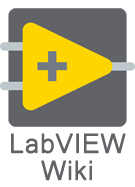NI Package Manager: Difference between revisions
Oli wachno (talk | contribs) No edit summary |
Oli wachno (talk | contribs) mNo edit summary |
||
| (2 intermediate revisions by 2 users not shown) | |||
| Line 22: | Line 22: | ||
* Distribution and execution of MSI installers | * Distribution and execution of MSI installers | ||
* Distribution of files and folder structures | * Distribution of files and folder structures | ||
* | * Distribution of multiple nipkg files (Package of Packages) | ||
== Internal structure of an NI Package == | |||
An *.nipkg file is an archive file which holds a defined file / folder structure. Detailed information can be found at https://www.ni.com/docs/en-US/bundle/package-manager/page/package-components.html | An *.nipkg file is an archive file which holds a defined file / folder structure. Detailed information can be found at https://www.ni.com/docs/en-US/bundle/package-manager/page/package-components.html | ||
== How to create nipkg files == | == How to create *.nipkg files == | ||
There are different possibilities to create nipkg files; the choice which one to actiually use is dependant on your workflow. | There are different possibilities to create nipkg files; the choice which one to actiually use is dependant on your workflow. | ||
| Line 38: | Line 38: | ||
Details to be added | Details to be added | ||
=== NI Package Builder === | === NI Package Builder === | ||
[[NI Package Builder]] | |||
=== nipkg.exe === | === nipkg.exe === | ||
Refer to https://github.com/mbilyk/NIPM-Tutorial/blob/master/README.md for details | Refer to https://github.com/mbilyk/NIPM-Tutorial/blob/master/README.md for details | ||
[[Category:NI Package Manager]] | |||
Latest revision as of 08:31, 8 January 2025
The NI Package Manager (https://www.ni.com/en/support/downloads/ni-package-manager.html) is NI's proprietary version of a Debian package manager software framework. Almost every NI Software is installed using NI Packages (*.nipkg). A very handy feature is the possibility to define package dependencies incl. version numbers.
Consuming NI Packages
The mostly known way of consuming *.nipkg files is the NI Package Manager GUI (%Programs%\National Instruments\NI Package Manager\NIPackageManager.exe on Windows machines). NI Package Manager GUI is registered as the default application for handling *.nipkg files during installation.
The GUI is an application providing easier access to the usage of the Package Manager. Generally speaking it is a Windows application wrapping the functionality of the underlying command line tool (%Programs%\National Instruments\NI Package Manager\nipkg.exe on Windows machines) and providing a kind of shop experience for the user.
INFO: since NI Package Manager is used to install software to the computer, it requires administrative privileges to run.
Use Cases for uisng NI Packages
- Installation of NI Software (like LabVIEW, TestStand, ....) and required components
- TestStand Deployments
- Installation of general software packages incl. required dependencies
Contents of NI Packages
A NI Package can consist of different contents depending on what kind of software needs to be distributed
- Distribution and execution of MSI installers
- Distribution of files and folder structures
- Distribution of multiple nipkg files (Package of Packages)
Internal structure of an NI Package
An *.nipkg file is an archive file which holds a defined file / folder structure. Detailed information can be found at https://www.ni.com/docs/en-US/bundle/package-manager/page/package-components.html
How to create *.nipkg files
There are different possibilities to create nipkg files; the choice which one to actiually use is dependant on your workflow.
Using LabVIEW Build script
Details to be added
Using TestStand Deployment Tool
Details to be added
NI Package Builder
nipkg.exe
Refer to https://github.com/mbilyk/NIPM-Tutorial/blob/master/README.md for details
